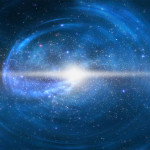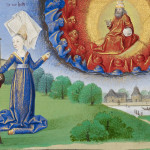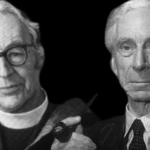Naturalism’s Epistemological Nightmare
by Dr. Dennis Bonnette
Filed under Atheism, Philosophy

Metaphysical naturalism, usually identified with scientific materialism, is not to be confused with methodological naturalism, which maintains, at least in principle, that the scientific method confines itself to natural explanations without any philosophical bias against the supernatural. Metaphysical or philosophical naturalism insists that only entities empirically verifiable by natural science exist, which excludes all supernatural beings, especially God. The truth value of all scientific statements depends strictly upon empirical verification. Since God is not empirically verifiable, He does not exist.
Scientific materialism agrees with Aristotle in saying that all knowledge begins in sensation. Yet, how do we know that we can trust our senses? Consider the case of the power of sight. Natural science tells us that light bounces off objects, passing through space, to enter the eye. Photons striking the retina are then converted into nerve impulses which pass through the optic nerve into the occipital lobe of the brain, where visual processing takes place. The question is what exactly do we experience in vision: (1) the external object as it is at some distance from the eye, (2) the external object as it is presented to the end organ in the eye, (3) changes in the end organ itself, or (4) changes inside the brain which appear to terminate the visual sequence?
Assuming that vision is a purely material process, this causal chain of events necessarily implies that what we know, in the last analysis, is not the external object, but rather changes in the occipital lobe deep inside the brain. The immanent logic of scientific materialism forces the conclusion that what we actually know by empirical verification is not the external world at all, but some sort of presumed image or neural representation of it inside our heads.
Empirical verification presupposes epistemological realism—meaning that through sensation we know directly the exterior physical world around us. Natural science proclaims that it discovers the nature of the real physical cosmos, external to our brains or subjective selves. Yet, when we trace the optics and physiology of the sense of sight, we find ourselves entrapped in epistemological idealism -- meaning that we do not know external reality, but rather merely some change within our brains that we hope to be an accurate representation of the external world.
Worse yet, naturalists tell us that modern science has discovered myriad ways in which the brain adjusts, fixes, completes, smooths, and modifies the incoming neural data so as to make the subjective sensation potentially quite different in content and meaning from that which the “raw data” of the external senses provide.
If we accept the foregoing depiction of visual sensation as correct, what does this imply for the “empirical verification” principle so dear to the hearts of naturalists? Specifically, how do we know that we have a head, a brain, an occipital lobe, light waves, or even an external physical world at all? The only way we have developed this scientific worldview of how sight works is by using our eyes to observe the component parts of the physiological/physical process entailed in vision. Someone had to use his eyes to view the brain of a cadaver and draw the pictures of a brain found in Gray’s Anatomy, or to verify that instrument readings are accurate. Yet, empirical observation using senses or instruments presupposes the validity of epistemological realism. Scientific findings about the visual chain of events, from external object to internal brain, drive the objective scientist into subjective idealism: we don’t directly sense the external world at all.
At this point, the naturalist likely resorts to defending epistemological realism by means of pragmatic verification: It works. Science has made massive progress through direct sense observation and repeatedly validates its theories through predictions that are empirically verified. Still, you simply cannot prove that the senses are reliable by using them in order to prove that they are reliable.
To verify scientific claims about the reliability of the senses, one must already trust them to apprehend external objects with sufficient accuracy so as to “empirically verify” the initial assumption that the senses apprehend external reality—the real physical world that natural science studies. Such circular reasoning proves nothing.
One naturalist defense is the distinction made between map and territory, between belief and reality – a distinction proposed by Alfred Korzybski, who insists that “the map is not the territory” in a book that claims to introduce “non-Aristotelian systems.”1 Unfortunately for naturalism, the “map,” in this case, is its own invention, since the causal chain from external object to occipital lobe is a product of scientific materialism. This naturalistic “map” itself must be wrong, since it leads to a subjective idealism that contradicts its own starting point: epistemological realism.
The final defense of naturalism is to insist that, though paradoxical, there is simply no alternative to scientific materialism and its acceptance of the validity of sensation.
But there is.
Naturalism entails assuming the philosophy of materialism. Materialism not only denies all non-material entities, but today would include as “matter” both matter and energy and, indeed, anything describable in terms of quantum field theory. While it may not be the physically extended “stuff” of the nineteenth century atomic theory, even energy or quantum fields remain locatable in spacetime dimensions. That is the fatal flaw of the materialistic causal sequence of vision described above. While the external object and its effect on the end organ of sight are both locatable external to the knower, the change in the brain, the image, the representation, is not external, but locatable internal to the knower. Thus, in knowing, ultimately, only changes inside himself, the materialist is logically forced into an epistemological idealism that contradicts his assumed starting point, the observation of external things. All of this flows from his a priori philosophical commitment to materialism. The scientific method does not demand materialism. But, the naturalist’s philosophical bias does.
What alternative is there to scientific materialism and its naïve epistemology? First, we must notice that all knowers start in the exact same place – prior to any scientific methodology. We all start with the same direct experience of the world, known through the senses – naturalist and Aristotelian philosopher alike.
The naturalist is right in taking as given an external physical world that he knows directly through sensation. But, he is wrong in trying to meld this experience with his philosophical position of materialism.
The immediate experience of sentient beings is of an external world of real things. Human beings, possessing the spiritual power of intellect, know not only of their own act of sensing but also are reflexively aware of the personal self which is having this experience of external objects.
One need not assume materialism to be the sole reality principle. If the above analysis demonstrates that materialism necessarily entails a self-defeating epistemology, then materialism must be false and some form of dualism must be true.2 That is, reality must include some non-material entities as well as material ones.
Aristotle maintains that co-principles (matter and form) compose physical substances. In living things, form is called the soul. In man alone, the soul is strictly immaterial (spiritual). Contrary to atomism, wherein nothing is a single thing (substance) above the atomic (or subatomic) level, substantial form makes the living organism to be a single, unified being of a given nature.3 Since all sentient organisms sense through powers of the soul, and since the soul is not itself physically locatable or extended, an ontological basis for epistemological realism exists. More simply, this means that since the soul’s sensation is not extended in space, and thus, physically “locatable,” it is not “trapped” in the interior of the brain as would be the case with scientific materialism. Our immediate experience of external reality shows that the living soul enables the whole organism to do things that exceed the capacities of a purely physical nervous system alone.
Instinctively rushing to reject Aristotelian metaphysical dualism, the naturalist might object that sensation ends in the interior of the brain, making such direct knowledge of external reality impossible. But, such an objection exposes again the contradiction inherent in combining philosophical materialism with epistemological realism. That is, the naturalist claims to know an external physical cosmos billions of light years in extent, and yet, his materialism forces the conclusion that he cannot know the external physical world at all – only images or neural patterns inside his own brain.
Naturalism cannot escape its own epistemological nightmare—a nightmare directly caused, not by natural science itself, but by illicitly attempting to identify natural science with the false philosophy of materialism.
Related Posts
Notes:
- Alfred Korzybski, Science and Sanity: An Introduction to Non-Aristotelian Systems and General Semantics (Institute of General Semantics; 5th edition, 1995). ↩
- Aristotle’s hylemorphic dualism distinguishes soul from body as co-principles of the same being, whereas Descartes’ extreme dualism views mind and body as entirely distinct substances. ↩
- For the best single volume refutation of naturalism and exposition of Aristotelian-Thomism, see Br. Benignus Gerrity, Nature, Knowledge, and God (Bruce Publishing Company, 1947). ↩
Note: Our goal is to cultivate serious and respectful dialogue. While it's OK to disagree—even encouraged!—any snarky, offensive, or off-topic comments will be deleted. Before commenting please read the Commenting Rules and Tips. If you're having trouble commenting, read the Commenting Instructions.












